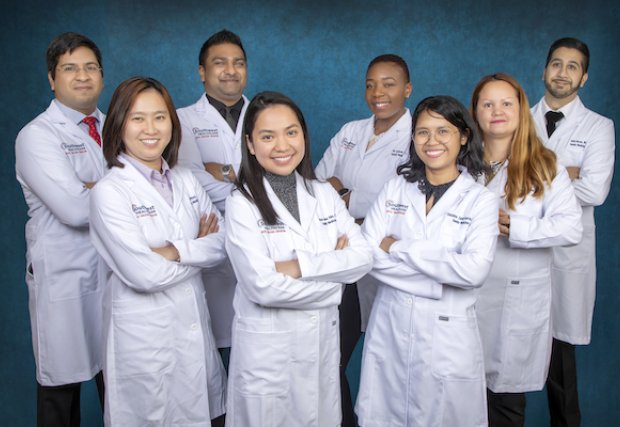Palmdale Regional Medical Center Hosts White Coat Ceremony for New Family Medicine Residency Program

Members of the first class of the Family Medicine Residency Program
Palmdale Regional Medical Center established a Family Medicine Residency Program beginning July 1, 2023. The hospital has partnered with community organizations and agencies to ensure the provision of a wide spectrum of services and curricula that are designed to provide residents with diverse learning experiences to hone their knowledge, skills and attitude. This will prepare them for independent practice of medicine.
Led by Program Director Romeo C. Castillo, MD, the hospital will train residents who value professionalism, excellence, compassion, dedication and hard work, and are receptive to the concept of whole-person care. “One of the most exciting and crucial phases in the physician professional journey is selecting training programs that will provide a strong foundation for autonomous clinical practice,” says Dr. Castillo. “We searched for candidates that possessed the attributes to which we aspire and where they could begin shaping their future at Palmdale Regional Medical Center as not only a place to learn, but a place to grow and give back.”
Family Medicine Residency Program at Palmdale Regional
“The Family Medicine Residency Program at Palmdale Regional Medical Center has been a vision for the hospital for a long time,” said Nana Deeb, Chief Executive Officer, Palmdale Regional Medical Center. “It is now a reality that will provide the Antelope Valley with potential new physician practices that are critically needed in the area. We start with Family Medicine but will grow the program to include Internal Medicine and General Surgery within the next couple years. This is just one of the many ways we want to give back to our community and increase the healthcare footprint in the Antelope Valley.”
The mission of Palmdale Regional’s Family Medicine Residency Program is to develop family medicine physicians as primary care specialists who will provide high-quality, compassionate, holistic and family-centered care to a diverse patient population with various needs and backgrounds. The goal of the program is to offer post-graduate residency training in Family Medicine for three years in length, complying with the guidelines and requirements of the Accreditation Council for Graduate Medical Education (ACGME). Residents will be provided with educational and learning experiences within the framework of the six core competencies to meet all the requirements for specialty board certification and with the ultimate goal of safe independent practice of Family Medicine as a specialty.
Education Goals of the Family Medicine Residency Program
Our program seeks to achieve these educational goals:
- To develop family medicine physicians who possess the necessary knowledge, skills and attitudes to provide holistic, comprehensive, culturally sensitive patient- and family-centered care to diverse communities within the Antelope Valley and nearby communities.
- To provide a diverse clinical learning experience in a variety of clinical settings, which will enable residents to become primary care physicians who are prepared to practice in any setting while providing excellent evidence-based care to various types of populations they will serve.
- To provide a learning experience that includes a strong foundation in population health management and an understanding of social determinants of health with the goal of improving clinical outcomes in cost-effective care.
- To provide training where the concept of adaptive learning and flexibility for individual learning is given high consideration by supporting residents’ areas of interest.
- To provide training that promotes and emphasizes personal growth, the culture of lifelong learning and well-being, that will lead to a long fulfilling career in primary care by equipping residents with the tools to enhance their educational experience and skills to maintain and sustain wellness and effective work-life balance.
- To provide a learning experience that fosters teamwork and strong inter-professional collaboration by providing a learning environment that promotes respect and collegiality.
- To provide training that incorporates a culture of inquiry, the environment of scholarship, and performance improvement by strengthening faculty role modeling and providing innovative pedagogical methods.
Long white coats represent the trainees’ transition from medical school to residency. The long coats indicate that the trainees have entered a new phase of medical education and symbolize the professionalism they must embody while providing care to patients and the public.
